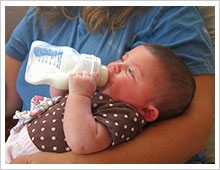
Infant formula and other nutrition products can contain GMOs, which have known health risks.
Even though the entire European Union, Australia, China, Japan, and Russia require GMO labeling, the United Sates does not.
California’s Proposition 37, which lost by a narrow margin in the November 6th election, vaulted the GMO labeling debate into a national spotlight.
Industry spent $46 million to defeat the proposition and overcome the fact that, according to a 2010 Thomson Reuters poll, 93% of Americans think that foods containing GMOs should be labeled. Labeling gives consumers the ability to make their own decision about the type of food they wish to feed to their families.
As You Sow strongly supports the labeling of GMOs for three reasons. Long-term safety testing has suggested significant health risks associated with the consumption of genetically engineered foods.
The most recent study was published in the peer-reviewed journal Food and Chemical Toxicology in September 2012. It found that lab animals fed GMO corn over a two year period had significantly shorter lifespans than a control group eating non-GMO corn, due to increased tumor growth in the breasts, pituitary gland, and liver.
Second, the toxic herbicide Roundup, commonly used to grow GMO crops, pollutes ground water and threatens farm workers’ health. Plus, farmers are having to use more and more of it as weeds become herbicide resistant.
Finally, genetically modified crops are a monoculture, which increases food security risks as blight could wipe out the entire agricultural system that would be protected through crop biodiversity.
For these reasons, As You Sow has filed a shareholder resolution with Abbott Laboratories asking them to remove GMOs from their nutritional products including infant formula and, during the transition period, label these products.
Until GMO technology is proven safe for long-term human consumption, it presents significant health and environmental risks to the company and its customers, particularly infants. Companies that place a high value on their customers’ health should be cognizant of these risks and consider reformulating to ensure they are delivering the best possible product.
Image: flickr/bradleyolin











